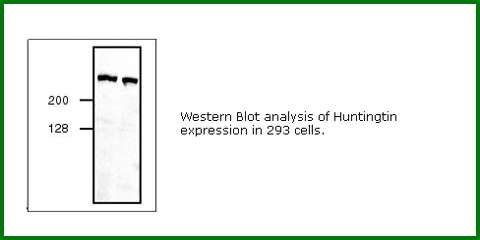Anti-Huntingtin Antibody
Specifications
| Cat. No. | G057 |
| Name | Anti-Huntingtin Antibody |
| Clone | H.F5 |
| Price | $236.00 |
| Unit | 100 μg |
| Category | Monoclonal Antibodies |
| Application | WB,IHC |
| Raised In | Mouse |
| Clonality | Monoclonal |
| Reactivity | Human |
| Description | Huntingtin (also known as Huntington's disease protein, Htt and HD protein) is the protein product of a disease gene linked to Huntington's disease, a neuro-degenerative disorder characterized by loss of striatal neurons. This may be caused by an expanded, unstable trinucleotide repeat in the huntingtin gene, which translates as a polyglutamine repeat in the protein product (see partial protein sequence below). The huntingtin gene locus is large, spanning 180 kb and consisting of 67 exons. It is expressed as 2 alternatively polyadenylated forms displaying different relative abundance in various fetal and adult tissues. The genetic defect leading to Huntington's disease may not necessarily eliminate transcription, but may confer a new property on the mRNA or alter the function of the protein. One candidate is the huntingtin-associated protein-1, highly expressed in brain, which has increased affinity for huntingtin protein with expanded polyglutamine repeats. Normal huntingtin protein shows a cytoplasmic localization. This protein is widely expressed with the highest level of expression in the brain (nerve fibers, varicosities, and nerve endings). In the brain, the regions where it can be mainly found are the cerebellar cortex, the neocortex, the striatum, and the hippocampal formation. |
| Immunogen | N-terminal pepetides 1-225 aa. |
| Isotype | IgG |
| Concentration | 100ug/100ul |
| Recommended Dilutions | Western blot and IHC in lipid metabolic research. Huntingtin is a 350kDa protein that is mutated in Huntington's disease (HD). The normal function of Huntingtin still remains uncertain but it has been suggested that it performs a necessary housekeeping function. The abnormal form of Huntingtin aggregates in vitro and forms neuronal intranuclear and cytoplasmic inclusions in HD patients. This antibody detects a 350KD band on western blots but also detects smaller degradation products_recover of Huntingtin in some tissue lysates. |
| Storage Buffer | PBS, pH 7.4 with 0.05% sodium azide. |
| Storage Condition | This product is stable for several weeks at 4° C as an undiluted liquid. Dilute only prior to immediate use. For extended storage, aliquot contents and freeze at -20° C or below. Avoid cycles of freezing and thawing. Expiration date is one (1) year from date of receipt. |
| Formulation | Liquid |
| Specificity | Recognize hungtingtin from human and mouse. |
| Guarantee | abm guarantees that all our Anti-Huntingtin Antibody will perform as described on this product webpage, if this is not the case we will provide you with a one-time replacement at no extra cost. Documentation and explanation of experiment conducted will be required when submitting a claim for replacement. |
| Depositor | ABM |
Protocols
There are no Protocols for this product yet!
Documents
There are no Documents for this product yet!
FAQs
There are no FAQs for this product yet!
Browse Other Antibodies:
Select Rasied In:
Armenian hamster
(0)
Bovine
(0)
Chicken
(0)
Donkey
(0)
Goat
(0)
Golden Syrian Hamster
(0)
Guinea pig
(0)
Hamster
(0)
Horse
(0)
Human
(0)
Mouse
(0)
Other
(0)
Rabbit
(0)
Rat
(0)
Sheep
(0)
Select Reactivity:
Avian
(0)
Bombyx mori
(0)
Bovine
(0)
C. elegans
(0)
Chicken
(0)
CMV
(0)
Dog
(0)
Drosophila
(0)
E. coli
(0)
Fusarium sepsis
(0)
Hamster
(0)
HBV
(0)
Horse
(0)
Human
(0)
Llama
(0)
Locusta migratoria
(0)
Manduca
(0)
Mosquito
(0)
Mouse
(0)
Notapplicable
(0)
Other
(0)
Pig
(0)
Planaria
(0)
Porcine
(0)
Quail
(0)
Rat
(0)
Rodent
(0)
Sheep
(0)
Species independent
(0)
Spodoptera frugiperda
(0)
Xenopus
(0)
Zebrafish
(0)

